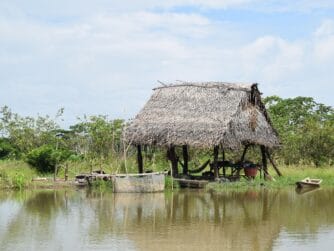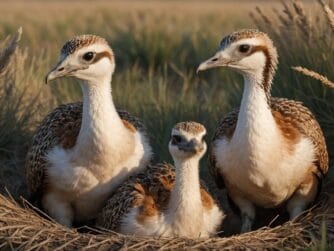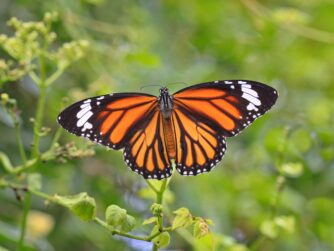Voice 1
Welcome to Spotlight. I’m Robin Basselin.
Voice 2
And I’m Colin Lowther. Spotlight uses a special English method of broadcasting. It is easier for people to understand, no matter where in the world they live.
Click here to follow along with this program on YouTube.
Voice 1
Far north in the Arctic Ocean there is a group of islands called Svalbard. Here, it is cold and windy. And everything in this place is white and frozen. There are no trees or plants. And there are very few animals. But on the side of one snowy mountain, there is a large building. This building holds the largest collection of seeds on the planet. It is the Svalbard Global Seed Vault. Although this vault is in Norway, it is for the whole world. Today’s Spotlight is on the Svalbard Global Seed Vault and how it is protecting the world’s crops.
Voice 2
People who grow crops know that seeds are important. For thousands of years, farmers have used their knowledge to build many different kinds or varieties of crop seeds. Each variety grows a little differently. Some varieties grow better in the cold. Others are stronger against disease. By combining different seeds, farmers can produce crops with new features. This helps farmers react to changes in climate, soil and crop diseases.
Voice 1
This process has produced a rich diversity of many different kinds of crops. But this diversity is at risk. Over the past 100 years many crops have become extinct. Farmers have stopped growing them and they no longer exist. The magazine National Geographic wrote a story on the importance of seed diversity and the future of food. They reported:
Voice 3
“The extinction of different food varieties is happening all over the world – and it is happening fast. In the United States, an estimated 90% of our historic fruits and vegetable varieties no longer exist. In the Philippines, thousands of varieties of rice once grew well. Now, farmers grow only about a 100 there. In China 90% of the wheat varieties grown just a century ago have disappeared. Experts estimate that we have lost more than half of the world’s food varieties over the past century.”
Voice 2
This rate of crop extinction is a serious problem. Without crop diversity, farmers cannot react to major changes in the environment. A good example of this is the Irish Potato Famine of 1845. The potato is a root vegetable that grows under the ground. Potatoes are a common food around the world. But they first appeared in South America, in the country of Peru. For thousands of years, farmers in this country have grown potatoes. And they have developed hundreds of different varieties.
Voice 1
In the 16th century, people brought the potato from South America to the country of Ireland. By the early 19th century, the potato became Ireland’s main crop. The problem was that the farmers of Ireland grew only one main kind of potato. And this caused a terrible crisis. In 1845, a disease spread among the potato crops in Ireland. Almost all of the crops died. People did not have potatoes to eat. 1 million people died from a lack of food. Another million people had to leave Ireland to survive. This was was a terrible tragedy. But it did not have to happen. If farmers had grown many different varieties of potatoes in Ireland, some of the potato crops would have resisted the disease. And this diversity of crops would have saved many lives.
Voice 2
Today, the world’s diversity of food crops is quickly shrinking. But scientists around the world are taking action. They are establishing seed banks. At seed banks, scientists store the seeds of many different crop varieties. Usually, seed banks store the best seeds from the local area. If stored well, people can use the seeds to grow particular crops again later.
Voice 1
There are now 1,400 seed banks around the world. But sometimes seed banks are unable to provide a safe environment for the seeds. Some banks are in warm countries. If the electricity fails, the seeds will get too hot and die. Other seed banks are in countries troubled by war or violence. Sometimes people damage the seed banks and even steal seeds. If this happens, valuable seeds can be lost forever.!
Voice 2
The organization Global Crop Diversity Trust decided they wanted to solve this problem. So they decided to build a global seed bank. This seed bank would contain a backup, or extra copy, of ALL the world’s seeds. Smaller seed banks would still collect and keep local seeds. But they would also send copies of their seeds to the global bank.
Voice 1
Scientists from the Global Crop Diversity Trust traveled all over the world to find a good place to build the global seed vault. Finally, they chose the cold snowy mountains of Svalbard, Norway. Svalbard is the perfect place to keep important seeds. It is far away from any earthquake areas. And, because it is high in a mountain, there is no danger of rising sea levels or flooding.
Svalbard’s Frozen temperatures are also good for protecting the seeds from possible power failures. The government of Norway already had a seed bank in Svalbard. So they already had systems and experience storing seeds. Norway is also a very peaceful country. Any military action in Svalbard is against the law. For these reasons the Global Crop Diversity Trust chose Svalbard for the Global Seed Bank. And in 2008, the Svalbard Global Seed Vault opened.
Voice 2
The Svalbard Global Seed Vault works like a bank. Organizations, farmers, or local seed banks store their extra seeds there. And the people who place their seeds in the vault are the only people who can take them out. They pay to ship their seeds to Norway. But it does not cost them any money to store their seeds. The Global Crop Diversity Trust pays for this. The trust also sometimes pays for poor farmers or countries to send their seeds to Svalbard. In these ways, the Global Crop Diversity Trust is protecting crop diversity around the world.
Voice 1
Carrie Fowler is a scientist who heads the Global Crop Diversity Trust. Fowler believes that the Svalbard Seed Vault provides an important service. In a paper about the seed vault, he wrote,
Voice 4
“In the case of a large global crisis, the Seed Vault would prove completely necessary to humanity. Still, we do not need to experience a global crisis in order for the Seed Vault to be useful. If the Seed Vault simply supplies seed banks with copies of seeds that those banks lost by accident, the Seed Vault will be worth way more than it cost.”
Voice 2
The writer of this program was Jen Hawkins. The producer was Michio Ozaki. The voices you heard were from the United States and the United Kingdom. All quotes were adapted and voiced by Spotlight. You can listen to this program again and read it on the internet at www.radioenglish.net. This program is called, “Global Seed Vault.”
Voice 1
We hope hope you can join us again for the next Spotlight program. Goodbye!
Question:
Do you like to grow vegetables in your garden? Do you think the Global Seed Vault is important for the survival of humanty?








Summer is coming, happy summer to the Spotlight team and its fans.
Thank you! Happy summer to you, too!
I am Severino Ramos, I am from Brazil, and I live in São Paulo City
Dear Jen Hawkins, Robin Basselin, Colin Lowther, and Michio Ozaki
How are things with you?
Global Seed Vault
Question 1 – Do you like to grow vegetables in your garden?
Yes, I do.
I would like to grow vegetables in my garden if I have one. I cannot grow vegetables or other fruit, for example, apples, bananas, and mangoes, because I live in an apartment.
Question 2 – Do you think the Global Seed Vault is important for the survival of humanity?
Yes, I do.
I completely agree with that idea. The seed banks are very important to help farmers with their growing, harvesting, and crops. I would like to become a farmer because I like the countryside, the forest, the animals, and its pure air.
Stay with God
I appreciate it
Severino Ramos
Yes, i like grow vegetables in my garden.
Mmm, maybe I think when ate vegetables you cab make a good healthy body.